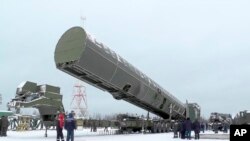After announcing Russia had developed new nuclear weapons, President Vladimir Putin on Thursday invited the nation to offer names for some of them - apparently not worried by Britain's red-faced experience doing the same thing.
In 2016, the most popular choice in an online competition to name a British polar survey vessel was Boaty McBoatface. That ship was eventually christened the Sir David Attenborough in honor of the naturalist, but the goofy moniker became the name of one of the country's remotely operated submarines.
The weapons for which Putin is soliciting names aren't anything to laugh about.
One is a nuclear-powered underwater drone capable of sneaking close to the shore unnoticed and blasting coastal areas away with a powerful nuclear explosion. Another is an atomic-powered cruise missile carrying a nuclear warhead that can fly around the globe and perform sharp maneuvers to dodge enemy defenses.
Just a couple of hours after Putin's speech, the Defense Ministry opened the online name contest.
Since Soviet times, Russia has had a tradition of giving innocuous names to some of the deadliest weapons in the nation's arsenal.
The sea-launched, nuclear-tipped intercontinental ballistic missiles were named with the Russian words for Liner and Azure. The Tu-160 nuclear-capable strategic bomber was called White Swan.
And the list of names of Russian artillery cannons sounds like a blossoming garden, including the heavy Peony, Hyacinth and Carnation howitzers.
Some of the names in the Russian arsenal also appeared to have a streak of cynical humor, like the Sun Heat rocket launcher that reduces broad areas to scorched desert.




